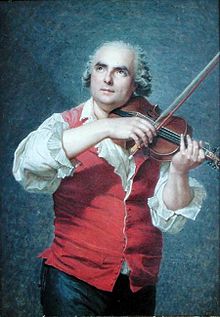Marie-Alexandre Guénin
Marie-Alexandre Guénin (born February 20, 1744 in Maubeuge , † January 22, 1835 in Étampes ) was a French violinist and composer in the Classical Age.
Life
Marie-Alexandre Guénin began taking violin lessons at the age of 6 with Jean Vanderbelen, music director of the Church of St.Pierre, who had taught François-Joseph Gossec a few years earlier . In 1760 Guénin came to Paris to continue his violin training with Pierre Gaviniès and Nicolas Capron (around 1740–1784). In Paris he met François-Joseph Gossec, who came from his homeland, Hainaut , who probably gave him a job as a violinist at the Freemason Lodge " Société académique des enfants d'Appollon ". Guénin remained a member of this lodge for 60 years.
Gossec gave the young Guénin lessons in harmony and composition, and in 1768 he gratefully dedicated his first compositions to Gossec, the " Six trios / dont les trois premiers ne doivent s'éxecuter / qu'à trois et les autres avec tout l'orchestre ... . "Which were successfully accepted. In the same year Guénin published his Opus 2, consisting of 2 violin concertos. In the 1770s, Guénin was one of the most successful violinists in France, alongside Jean-Marie Leclair , Pierre Gaviniès , Pierre Rode , Pierre Baillot , Nicolas Capron and a few others.
In 1773 Guénin made his first appearance as a soloist at the Concert spirituel in a concertante symphony by Jean-Baptiste Davaux, alongside Nicolas Capron . Through Gossec's mediation, the then head of the institution, Guénin found a job in 1776 as leader of the 2nd violins at the Concert spirituel. In 1777 he was next to Joseph Legros (1739-1793) director of the Concert spirituel. In addition to this activity, he took over the management of the court music of the Prince de Condé, at the beginning of 1778 he was one of the musicians of the Chambre du roi in Versailles, where he gave several private concerts in the Palais du Trianon at the request of Queen Marie-Antoinette . In 1780 Guénin became concertmaster at the Concert spirituel and two years later at the Paris Opera , a position he held for 30 years.
In addition to his musical talent, Guénin knew how to surround himself with influential patrons from Masonic circles. On the occasion of Voltaire's introduction to the lodge on April 7, 1778 in the presence of Benjamin Franklin , Minister of the United States of America, Guénin performed his 3rd symphony from his Opus 4.
In 1783 Guénin was instrumental in founding a music school based on the model of Italian conservatories. The “ École royale de chant et de déclamation ”, which was a forerunner of the Conservatoire National de Musique founded in 1795, was created. In this school Guénin took over the violin class, which he directed until 1791.
In the first years of the revolution Guénin retained his position as concertmaster at the Concert spirituel and at the opera. After the Conservatory was founded, Guénin remained one of the violin teachers until he was replaced by Rodolphe Kreutzer in 1803 . Then he lost all offices and received only a small pension. There are no statements about the period between 1803 and 1809, he certainly gave private lessons and some concerts. At the beginning of 1809 he was a violist in the court orchestra of the abdicated Spanish King Charles IV in his exile in Marseille. There he met the well-known cellist Jean-Louis Duport (1749–1819) and composed among other things his Viola Concerto op. 14 and three duos for violin and cello. After a short stay in Rome, he returned to Paris and, through the mediation of Luigi Cherubini, received a position as a violinist in the “ Chapelle Royale des Tuileries ” of King Louis XVIII. His last known appearance took place in October 1822 at the “ Société Académique des Enfants d'Apollon ”. In 1823 he retired to his daughter's estate in Étampes, where he died in 1835 at the age of 91.
His son Hilaire-Nicolas Guénin (* 1773) was a pianist and composer.
Works (selection)
- Op. 1: 6 trios, "dont les trois premiers doivent s'exécuter à trois, les autres à l'orchestre"
- Op. 2: 2 violin concertos, dédiés au comte de Montrevel
- Op. 3: 6 duos for 2 violons dédiés à M. Guelle, contrôleur général des Suisses et Grisons.
- Op. 4: 3 symphonies. dédicacée au prince de Rohan-Guémenée
- Op. 5: 3 Sonates pour le clavecin avec accompagnement de violon
- Op. 6: Trois nouvelles Symphonies, dédiées au Duc de Polgnac (1788)
- Op. 7: 6 quatuors à cordes
- Op. 9: 3 Sonates en trio
- Op. 10: Sonates
- Op. 13: 3 duos
- Op. 14: Concerto pour alto et orchester
- Op. 18: Trois duos faciles pour deux violoncelles
literature
- Claude Role: “ Marie-Alexandre Guénin, violonist et compositeur maubeugeois. 1744-1835 “Maubeuge, Association Les amis du livre, 2003, ISBN 2-9514413-2-0 .
Individual evidence
- ↑ Guénin's curriculum vitae ( Memento of the original dated May 11, 2011 in the Internet Archive ) Info: The archive link was inserted automatically and has not yet been checked. Please check the original and archive link according to the instructions and then remove this notice.
- ↑ http://www.corpusetampois.com/cae-18-guenin2007jeanbelliard.html
- ↑ http://musiqueclassique.forumpro.fr/t2503-marie-alexandre-guenin
- ^ Fétis, Biography Universelle
| personal data | |
|---|---|
| SURNAME | Guénin, Marie-Alexandre |
| BRIEF DESCRIPTION | French composer and violinist |
| DATE OF BIRTH | February 20, 1744 |
| PLACE OF BIRTH | Maubeuge , France |
| DATE OF DEATH | January 22, 1835 |
| Place of death | Etampes |
